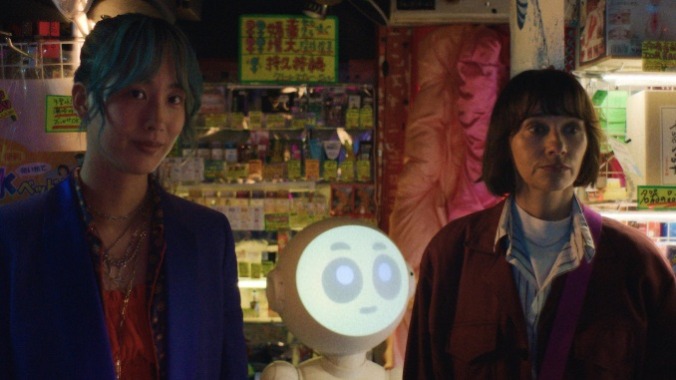Sunny Is a Solid Dark Comedy About Robots and Loneliness
Photo Courtesy of Apple TV+
These days, it’s increasingly difficult to feel optimistic about the future that Big Tech is laying out for us. Whether it’s how ”AI” and large language models have been used to systematically steal people’s work and repurpose it as ugly, soulless garbage, or perhaps most pressingly, the way robotics are being leveraged for military applications, as long as massive, unfettered corporations are the ones providing these “innovations,” someone will almost always end up as collateral damage.
Thankfully, sci-fi is here to help us contemplate and prepare ourselves for what’s on the horizon, as is the case with Sunny, an upcoming dramedy from Apple TV+ and A24. This series largely succeeds at taking a grounded view around the robots and AI, focusing on loss and loneliness amidst a near-future backdrop. All in all, it makes for a twisty tale about machines that mostly passes the quality inspection.
This story, adapted from Colin O’Sullivan’s novel The Dark Manual, follows Suzie Sakamoto (Rashida Jones), an American expat who just received the tragic news that her husband, Masa (Hidetoshi Nishijima), and son, Zen, have gone missing in a plane crash. At first, she’s understandably devastated, making her already prickly demeanor even more unapproachable. But, of course, there’s more to this situation than initially appears. Suzie is eventually greeted by a representative from her husband’s company, ImaTech, who offers a gift to assuage her loss: a top-of-the-line home robot named Sunny that Masa himself designed. There are two issues with this, though: one, Suzie hates bots, and two, her husband had lied about his profession and never told her he was a roboticist. While Suzie is initially disenchanted with her new roommate, she soon finds that the machine is essential in discovering the truth about her husband and what happened to her family.
Despite the seemingly entirely grim premise, Sunny is very much a dark comedy, and these elements are present from the jump—immediately after the crash, Suzie drowns out her sorrows with shitty Christmas cookies as holiday tunes blare in the background, an overly cheery airline employee asking her what her family was wearing before they seemingly disappeared for good. The sequence ends with Suzie in a group crying session where a man tries to get her to weep so he can wash away the tears by hand, Jones’ incredulity selling the absurdity of the situation.
While the tragicomic sensibilities aren’t quite this front and center throughout, the show has a consistently playful tone thanks to snappy editing, clever needle drops, and plentiful banter between the cast, as Katie Robbins and the rest of the writers’ room largely succeed at balancing lighter moments and Suzie’s weighty grief. It’s rarely laugh-out-loud funny, but much of the dialogue is clever, and the script smartly conveys how ridiculous it is that big tech companies have been given this much free reign.
On top of balancing humor and loss, the series also delivers an elaborate cyber conspiracy as Suzie seeks to understand what her husband was really up to at ImaTech. This mystery is gripping from the start, and between the premiere’s violent cold open that invites all sorts of intriguing possibilities, plentiful hints at corporate wrongdoing, and hidden cameras, we’re immersed in a paranoid headspace alongside our protagonist. Perhaps best of all, these implications eventually arrive at compelling conclusions about the costs and benefits of pushing so hard for AI and other groundbreaking tech, leading to fascinating turns I’ll avoid spoiling. And despite questions about large-scale schemes, the biggest question here is more personal: who was Suzie’s husband?
Early on, our protagonist realizes that Masa wasn’t forthright about his true job at ImaTech, prompting her to wonder just how much he withheld. The further she digs, the more confused and guilty she feels that she spent 10 years with a man she may have misjudged, putting her son at risk in the process. It’s a well-explored thread about how we can miss crucial pieces of those closest to us, and it further complicates our protagonist’s feelings of grief in engrossing ways, explaining her desperate and self-destructive tendencies as she tries to get to the bottom of things. Her frustration is cleverly conveyed in a series of flashbacks where she recounts moments that should have roused her suspicion, inter-spliced with Suzie blurting out what she wishes she said.
These pseudo-memories are just one of many interesting aesthetic touches in this stylishly presented series. For instance, there’s also the chic intro, which looks ripped from a ‘60s spy movie, or the vintage Japanese pop music that serenades tongue-in-cheek happenings in a way that fits the comedic tone. The set design places us in this not-so-far-flung Japan, particularly ImaTech’s quietly sinister retro-futuristic HQ, which will likely make you suspicious, if you weren’t already.
-

-

-

-

-

-

-

-

-

-

-

-

-

-

-

-

-

-

-

-

-

-

-

-

-

-

-

-

-

-

-

-

-

-

-

-

-

-

-

-








































